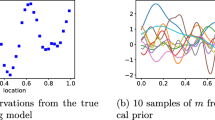Abstract
The use of the ensemble smoother (ES) instead of the ensemble Kalman filter increases the nonlinearity of the update step during data assimilation and the need for iterative assimilation methods. A previous version of the iterative ensemble smoother based on Gauss–Newton formulation was able to match data relatively well but only after a large number of iterations. A multiple data assimilation method (MDA) was generally more efficient for large problems but lacked ability to continue “iterating” if the data mismatch was too large. In this paper, we develop an efficient, iterative ensemble smoother algorithm based on the Levenberg–Marquardt (LM) method of regularizing the update direction and choosing the step length. The incorporation of the LM damping parameter reduces the tendency to add model roughness at early iterations when the update step is highly nonlinear, as it often is when all data are assimilated simultaneously. In addition, the ensemble approximation of the Hessian is modified in a way that simplifies computation and increases stability. We also report on a simplified algorithm in which the model mismatch term in the updating equation is neglected. We thoroughly evaluated the new algorithm based on the modified LM method, LM-ensemble randomized maximum likelihood (LM-EnRML), and the simplified version of the algorithm, LM-EnRML (approx), on three test cases. The first is a highly nonlinear single-variable problem for which results can be compared against the true conditional pdf. The second test case is a one-dimensional two-phase flow problem in which the permeability of 31 grid cells is uncertain. In this case, Markov chain Monte Carlo results are available for comparison with ensemble-based results. The third test case is the Brugge benchmark case with both 10 and 20 years of history. The efficiency and quality of results of the new algorithms were compared with the standard ES (without iteration), the ensemble-based Gauss–Newton formulation, the standard ensemble-based LM formulation, and the MDA. Because of the high level of nonlinearity, the standard ES performed poorly on all test cases. The MDA often performed well, especially at early iterations where the reduction in data mismatch was quite rapid. The best results, however, were always achieved with the new iterative ensemble smoother algorithms, LM-EnRML and LM-EnRML (approx).
Similar content being viewed by others
References
Arenas, E., van Kruijsdijk, C., Oldenziel, T.: Semi-automatic history matching using the pilot point method including time-lapse seismic data. In: SPE Annual Technical Conference and Exhibition, 30 September–3 October 2001. New Orleans, Louisiana (2001)
Bocquet, M., Sakov, P.: Combining inflation-free and iterative ensemble Kalman filters for strongly nonlinear systems. Nonlin. Process. Geophys. 19(3), 383–399 (2012)
Bogaert, P.: Spatial prediction of categorical variables: the Bayesian maximum entropy approach. Stoch. Environ. Res. Risk Assess. 16(6), 425–448 (2002)
Chen, Y., Oliver, D.S.: Ensemble-based closed-loop optimization applied to Brugge Field. SPE Reserv. Eval. Eng. 13(1), 56–71 (2010)
Chen, Y., Oliver, D.S.: Ensemble randomized maximum likelihood method as an iterative ensemble smoother. Math. Geosci. 44(1), 1–26 (2012)
Emerick, A., Reynolds, A.: Investigation of the sampling performance of ensemble-based methods with a simple reservoir model. Comput. Geosci. 17, 1–26 (2013)
Emerick, A.A., Reynolds, A.C.: Ensemble smoother with multiple data assimilation. Comput. Geosci. Available online 17 March (2012)
Golub, G.H., van Loan, C.F.: Matrix computations, 2 edn. The Johns Hopkins University Press, Baltimore (1989)
Gu, Y., Oliver, D.S.: An iterative ensemble Kalman filter for multiphase fluid flow data assimilation. SPE J. 12(4), 438–446 (2007)
Li, G., Reynolds, A.C.: Iterative ensemble Kalman filters for data assimilation. SPE J. 14(3), 496–505 (2009)
Li, R., Reynolds, A.C., Oliver, D.S.: History matching of three-phase flow production data. SPE J. 8(4), 328–340 (2003)
Liu, N., Oliver, D.S.: Evaluation of Monte Carlo methods for assessing uncertainty. SPE J. 8(2), 188–195 (2003)
Menke, W.: Geophysical data analysis: discrete inverse theory, revised edn. Academic, San Diego (1989)
Oliver, D.S., Reynolds, A.C., Liu, N.: Inverse theory for petroleum reservoir characterization and history matching, 1st edn. Cambridge University Press, Cambridge (2008)
Peters, E., Chen, Y., Leeuwenburgh, O., Oliver, D.S.: Extended Brugge benchmark case for history matching and water flooding optimization. Comput. Geosci. 50(1), 16–24 (2013)
Peters, L., Arts, R.J., Brouwer, G.K., Geel, C.R., Cullick, S., Lorentzen, R.J., Chen, Y., Dunlop, K.N.B., Vossepoel, F.C., Xu, R., Sarma, P., Alhutali, A.H., Reynolds, A.C.: Results of the Brugge benchmark study for flooding optimization and history matching. SPE Reserv. Eval. Eng. 13(3), 391–405 (2010)
Sakov, P., Oliver, D.S., Bertino, L.: An iterative EnKF for strongly nonlinear systems. Mon. Weather Rev. 140(6), 1988–2004 (2012)
Skjervheim, J.-A., Evensen, G.: An ensemble smoother for assisted history matching. In: SPE Reservoir Simulation Symposium, 21–23 February. The Woodlands, Texas (2011)
Tarantola, A.: Inverse problem theory and methods for model parameter estimation, p. 348. Society for Industrial Mathematics, Philadelphia (2005)
Wu, Z., Reynolds, A.C., Oliver, D.S.: Conditioning geostatistical models to two-phase production data. SPE J. 4(2), 142–155 (1999)
Zhang, F., Reynolds, A.C.: Optimization algorithms for automatic history matching of production data. In: Proceedings of 8th European Conference on the Mathematics of Oil Recovery (2002)
Author information
Authors and Affiliations
Corresponding author
Rights and permissions
About this article
Cite this article
Chen, Y., Oliver, D.S. Levenberg–Marquardt forms of the iterative ensemble smoother for efficient history matching and uncertainty quantification. Comput Geosci 17, 689–703 (2013). https://doi.org/10.1007/s10596-013-9351-5
Received:
Accepted:
Published:
Issue Date:
DOI: https://doi.org/10.1007/s10596-013-9351-5



